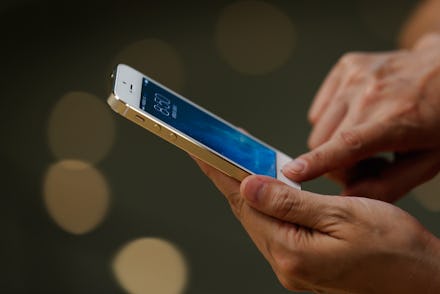Fingerprint Sharing: The Most Important (and Risky) Symbol of Trust in the Digital Age

Fingerprints are our most dependable and personal method of identification. In today's world, they're the gateway to our entire digital lives. They unlock our phones, even our bank accounts. So would you ever share your fingerprint with someone close to you?
It's a simple process: Let your desired recipient register their print on your phone, and they'll be able to unlock it — and everything inside — with a tiny thrust of the finger.
It may seem like a trivial gesture. In the context of other demonstrations of friendship or love, smartphone access is far from an engagement ring. Still, there's a certain intimacy and weight that comes from sharing your fingerprint with someone close to you. It's like pulling an Angelina Jolie and chaining a vial of blood to your neck or ferreting away a lock of hair in a tiny box in your closet.
It's also a practical measure. "Hey, can you read what my mom just texted me?" you can ask. "My hands are covered in flour — can you pull up the recipe?" But unlike sharing your passcode, a fingerprint represents commitment, affection and permanence. Numbers change, fingerprints don't.
"I would say that in most cases it indicates trust," Gwendolyn Seidman, an associate professor of psychology at Albright College who specializes in social psychology and relationships, told Mic in an email. "It would signal that you trust your partner not to read private messages or emails, or use your phone to impersonate you."
When it comes to romance, the stakes are high. For some couples, autonomy is more important than practicality. Naturally, some people in relationships will be anti-fingerprint-sharing.
"To me, it's unnecessary. As a symbol of trust and affection, it betrays an underlying insecurity that you need that failsafe," 24-year-old Alexander Kaufman, an editor in New York, told Mic. For Kaufman and his girlfriend, the gesture takes an uncomfortable shape; both said they found it invasive. "I just trust her," he added. There's no need for that level of access, because the confidence is implicit.
Kaufman's girlfriend, Amanda Luz Henning Santiago, agrees. "If you feel like you need it, I don't see how you're trusting that person," she told Mic. "I would interpret it as having some ulterior motive," Kaufman suggested.
Passwords change, fingerprints don't.
"What about the magic? Keep some stuff to yourself," said Santiago, 24. "Intimacy is built between you and your partner. I don't think having access to their networks has anything to do with that." She conceded that it was different for friends — "I could see that being more fun, but if you're in a relationship there's a lot more weight attached to it" — but in the end, it's about the fundamentals.
"The principle of the issue is just privacy, and I think it's, on a base level, wrong," she said. "It's more just kind of like, why are you interested in this? Even though there's nothing there that I'm trying to hide, it's just weird. It just shows that the person doesn't really trust you."
I tried it out with a close friend recently. We exchanged right thumbprints and waited the standard — and irritatingly long — time for the sensor pad to collect every ridge, peak and curve. When it finished, we shared the same kind of mild delight that comes when a friend confides a secret in you.
A few nights later, as we sat on her couch watching Arrested Development, she asked me to check something on her phone because I was closer. I absentmindedly put my thumb on the sensor, forgetting I could actually open it. When her home screen appeared, I shouted, "Shit! I forgot I could do that."
Knowing there was enough trust floating around the interior of our friendship to make this possible was a small jolt. It seemed silly, but in theory, I had access to virtually every important part of her life: texts, emails, money, Google history, health, appointments, photos, videos, transportation options, romantic prospects, work correspondence, recent calls. I could find exes, family members, therapists and accountants. And she could say exactly the same of me.
What the experts say: Seidman likened the fingerprint access to a family sharing a home computer. "To me, adding your partner's fingerprint unlock is an indication that you're treating the phone as a shared good that anyone in the family can use," she said. "You are assuming others in the family would not violate your privacy by reading your messages — [like] you assume that others in your household are not reading your emails if you leave your email open on the household computer."
She also pushed back on Kaufman's and Santiago's assertion that the gesture automatically betrayed a lack of trust, and noted that it can also serve a practical purpose, as I discovered with my friend. "You might use your partner's phone to check something on the Internet, make a quick call to order takeout food, or use the GPS feature," she said.
"I agree that if the purpose of having access to your partner's phone is to snoop or to create a threat of snooping that will prevent your partner from 'bad behavior,' then that certainly indicates a lack of trust," Seidman said.
But barring that, the feature is just another way to make life easier.